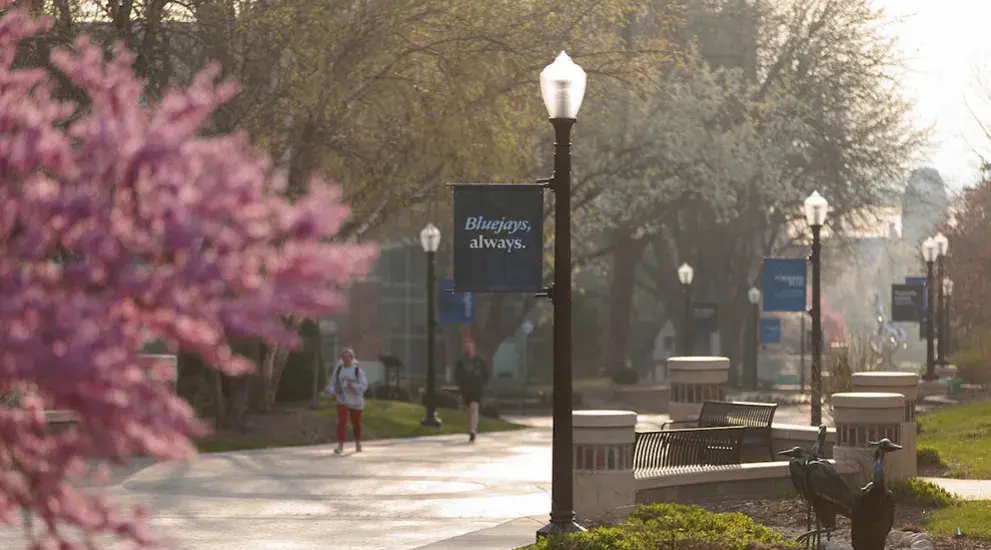Underage Drinking
In 2024, more than two-thirds (67.2%) of Creighton students reported they abstained from drinking.

Each year, Creighton encourages first-year students to participate in the Year 1 College Behavior Profile survey, which allows students to self-report perceptions and actual behaviors related to alcohol and marijuana use. Creighton students also participate in the Nebraska Assessment of College Health Behaviors Survey every two years to self-report attitudes and behaviors related to alcohol and drug use, mental health, and personal violence. Take a look at key takeaways from these survey’s below, and then explore tips for parents who want to talk to their students about substance use.
In 2024, more than two-thirds (67.2%) of Creighton students reported they abstained from drinking.
95.2% of Creighton students report they do not binge drink.
Binge drinking is defined as 5 drinks for men and 4 drinks for women within a 2-hour period.
In 2024, 92% of Creighton students reported they had not used marijuana in any form (smokable, edible or derivatives) in the past year.
In 2024, 56% of Creighton students indicated they would not approve of a peer drinking excessively to the point of not remembering parts of the previous evening.
55% of Creighton students said that they would not approve of a peer drinking so much that they become sick.
61% of Creighton students said they would not approve of a peer putting themselves in situations they might later regret.
97% of Creighton students indicated they would not approve of a peer driving after consuming any amount of alcohol.
This type of information is important to share with your student because it dispels the perception that all of their peers are drinking, drinking excessively or using marijuana/cannabis. When students realize they’re not alone in either abstaining from substances or, at the very least, using in moderation, they feel more comfortable declining the invitation to drink or use substances at social events.
Data retrieved from the 2024 Creighton Y1CBP and NACHB reports.
Creighton University recognizes that alcohol is a major influence on today’s college campus and that it has a responsibility to educate students and their families on University expectations regarding alcohol. Furthermore, Creighton recognizes that it must go beyond simply informing students and their families about the legal consequences resulting from alcohol use, as Creighton’s response must also address the social realities of our students while continuing to promote and educate students about the benefits of living a healthy lifestyle.
Research suggests that student socializing patterns are often established in the first six weeks of their first year on campus. Factors that can influence high-risk behaviors within a social setting include group drinking norms. We know that parents talking with their college students about alcohol use won't put an end to alcohol consumption. However, we do believe that having these conversations is one powerful tool to discourage underage drinking or, at least, to encourage responsible behavior that does not put your student at risk of serious negative consequences.
College students often begin drinking socially and think they can handle it on a regular basis while at the same time keeping things in perspective. There are long and short-term consequences of such experimentation. Most college students believe that drinking coffee will help sober you up, making you less drunk. This is not true and can lead to situations where your student may take dangerous risks (such as drinking more or driving drunk) because they have just had a cup of coffee.
Some students also believe that police can’t tell if they’re driving under the influence of cannabis/marijuana, or that they drive better when they’re high. However, many law enforcement officers are trained Drug Recognition Experts (DREs) who have the ability to detect physical and psychophysical signs of drug impairment. DREs are viewed as one of the most effective law enforcement tools in efforts to reduce drugged driving. Research shows that cannabis affects the critical abilities needed to drive, such as reaction time, decision making, and the perception of time and distance, along with several others. Visit FeelDifferentDriveDifferent.org to learn more.
Some students believe that “legal” substances such as Delta 8 are safe to use because they are not illegal. However, Delta 8 is a psychoactive substance that has not been evaluated or approved by the FDA for safe use. Delta 8 products may also show up on drug tests, and there is no way to differentiate between Delta 8 or Delta 9 (marijuana/cannabis) on positive drug tests.
Marijuana is an illegal substance in Nebraska. Driving under the influence, possession, sale, and manufacture of marijuana are all violations that carry varying degrees of legal consequences.
Whether alcohol or drug infractions occur on campus or off, they are also considered violations of the Student Handbook and can result in on-campus sanctions and legal consequences.
The choices your student makes today can have long-lasting consequences. Many companies, including public and private schools, are now screening applicants for past legal problems with alcohol. Applications to a professional school including, but not limited to nursing, physical therapy, law, dental or medical may also be affected if students have been found responsible for violating the Student Handbook. Applicants to such schools are typically required to report any Student Handbook violations as part of their application. Social media platforms offer broader insight into a person’s activities, and employers can easily access online profiles.
